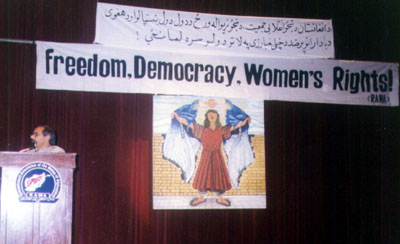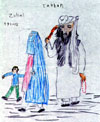Afghan feminists go online
RAWA wants to publicise the plight of Afghan women
A group of Afghan feminists have turned to the internet to draw attention to atrocities and human rights abuses committed against women under Taleban rule.The Revolutionary Association of the Women of Afghanistan (RAWA) - based in Peshawar in neighbouring Pakistan - say they hope their website will increase international awareness of the plight of women in Afghanistan.
RAWA says it has around 2,000 members who work both outside and inside Afghanistan.
They secretly educate young girls and raise funds to help women made destitute by the Taleban ban on them working.
Their website is not for the squeamish.
It contains many photographs of what RAWA says are atrocities committed against women, which have apparently been smuggled out of Afghanistan.
Under the Taleban, women are banned from working outside their homes.
The fundamentalist regime has also stopped them attending schools and universities and forced women to be veiled from head-to-toe in public.
Health care is segregated and often it is difficult for a woman to see a male specialist.
And Taleban radio has warned that women not obeying these edicts will "face punishment".
A child's view of life under the TalebanA RAWA spokeswoman told BBC News Online that they had not been able to provide their supporters inside Afghanistan with internet facilities, because of the "watchful eye" of the Taleban.
"Our chief purpose, therefore, is to awaken the world to the plight of women in Afghanistan".
Technical assistance and training for the website have been provided by men, but the site is maintained and developed only by women.
Threats
The spokeswoman said RAWA had received threats via the internet, many of which had been vulgar and salacious.
But, she added, their website needed visitors and publicity.
The women say they are committed to non-violent change.
But both inside Afghanistan and in Pakistan most of the group's work has to be carried out in secret and can be dangerous.
The spokeswoman said the Taleban had issued a fatwa or Islamic sentence against RAWA members.
Television is banned under the Taleban"They have ordered their forces to arrest any RAWA members on sight and stone them to death in public," she said.
The women say that so far they have been lucky. Several activists had been arrested, but had later been released.
'Pariah status'
A United Nations report on religious extremism in October last year said women in Afghanistan had been reduced to pariah status, being afflicted by social, economic and cultural exclusion.
The human rights organisation, Amnesty International, said in a report that under the Taleban women were being punished for violations of their Islamic code by stoning to death.
The Taleban's own website says the international media are distorting the situation in the country and that they are "fully committed to the social, cultural and economic development of women" in employment, education and other areas.
Images reproduced with the kind permission of RAWA.
From: http://news.bbc.co.uk/hi/english/world/south_asia/newsid_1235000/1235583.stm
Afghanistan's clandestine army (BBC News, 25 September 2001)


